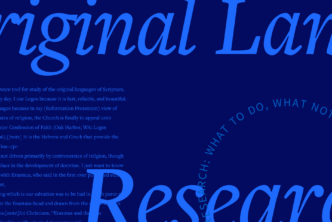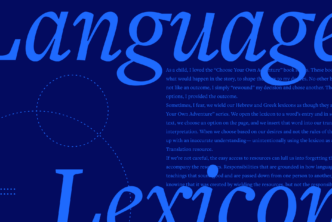When I was at theological college, it was a great privilege to learn Greek and Hebrew. It was hard work, especially the Hebrew, but I took all the classes Kenmore Christian College would let me take during my four years there. Afterwards, I did my best to keep using the languages, but it was so easy to let it lapse.
I only lasted two and a half years in ministry and then went back to teaching high school music. I hardly looked at Hebrew. I did read my Greek New Testament—in fact, I read through the whole thing a few times, but would also spend long periods without doing any Greek.
Getting connected
At the end of 1996, I logged onto the internet for the first time and discovered rich resources there, including the B-Greek discussion group. (I’m no longer in the group, but it is still active.)
A few years later, we moved to Bathurst (about three hours from Sydney) and David, my minister, invited me to read the Greek New Testament with him once a week. It was wonderful to have a friend to read with. But this only lasted for a few years. He was appointed to a church elsewhere, and I didn’t find another reading buddy.
Two years ago, I decided to put out a request on Facebook and see if anyone wanted to read with me. The next day, my friend Geoffrey, from Toowoomba in Queensland, accepted my offer. We started reading First John over the phone together and enjoyed it very much. Our goal was to learn to read without parsing or translating. We wanted to read our Greek New Testaments with the same facility as our English Bibles.
Over two years, for half an hour each week, we read John’s letters and Gospel, Peter’s letters, and the Gospel of Mark, Paul’s letters to the Thessalonians and Romans, and now we are bravely attempting Acts. We have been fairly regular, because we set a time of night where both of us are usually free of commitments. And we can hear each other improving in reading. As we read to each other, week to week, it sounds more like we are reading a book, not translating one.
Again, but in Hebrew
I began to wonder if I could find a friend to read Hebrew with, and a day or so after I put out another call on Facebook, Timothy, a Presbyterian pastor in Muswellbrook, New South Wales, told me he’d give it a go.
Geoffrey and I both studied our Greek back in the late 1970s, but Timothy, who had also studied Hebrew for four years, but at Sydney’s Moore College, was a recent graduate. When Tim and I read Hebrew, one of us reads a verse, attempts to translate it, then passes it over to the other fellow. Thus far, we’ve read a few chapters of First Kings, and readings from Pelt and Pratico’s A Graded Reader of Biblical Hebrew. My Hebrew is still weak, but it’s improving.
One thing I have discovered in attempting to read and translate Hebrew is that a literal translation of the Hebrew text is still quite a distance from any English translation, including the “literal” ones. We enjoy puzzling over how our English translations got from a raw rendering of the biblical text, to something that sounds acceptable in English and makes sense.
Resources for retaining Greek and Hebrew
There are plenty of great aids to “keeping your Greek,” including Con Campbell’s book, Greek for Life, Hebrew for Life, and many others. There’s Daily Dose of Greek and Daily Dose of Hebrew, accessible on YouTube and elsewhere. There’s Aleph with Beth and Alpha with Angela, also on YouTube, which use the excellent immersive approach.
But having someone to read with once a week keeps me motivated and is even helping us to improve our facility, at least a little.
Timothy uses A Reader’s Hebrew Bible and Geoffrey reads from his Greek New Testament. I use Logos Bible Software open to the NA28 Greek New Testament and the Lexham Hebrew Bible, with the NASB95 alongside.
***
Further resources
Greek for Life: Strategies for Learning, Retaining, and Reviving New Testament Greek
Regular price: $19.99
Nestle-Aland Greek New Testament, 28th Edition, with Critical Apparatus (NA28)
Regular price: $99.99






